Moudle9 Great Inventions词汇短语句型精讲 课件(共71张PPT)
文档属性
| 名称 | Moudle9 Great Inventions词汇短语句型精讲 课件(共71张PPT) |
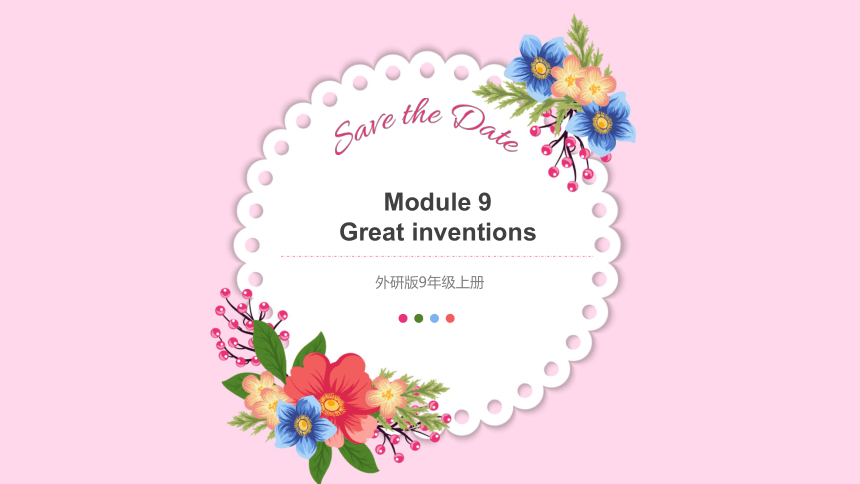
|
|
| 格式 | pptx | ||
| 文件大小 | 14.0MB | ||
| 资源类型 | 教案 | ||
| 版本资源 | 外研版 | ||
| 科目 | 英语 | ||
| 更新时间 | 2021-07-21 00:00:00 | ||
图片预览

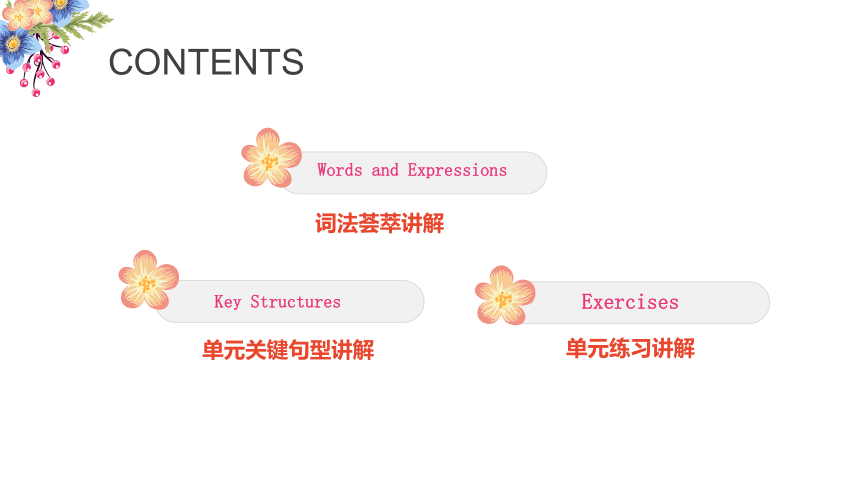
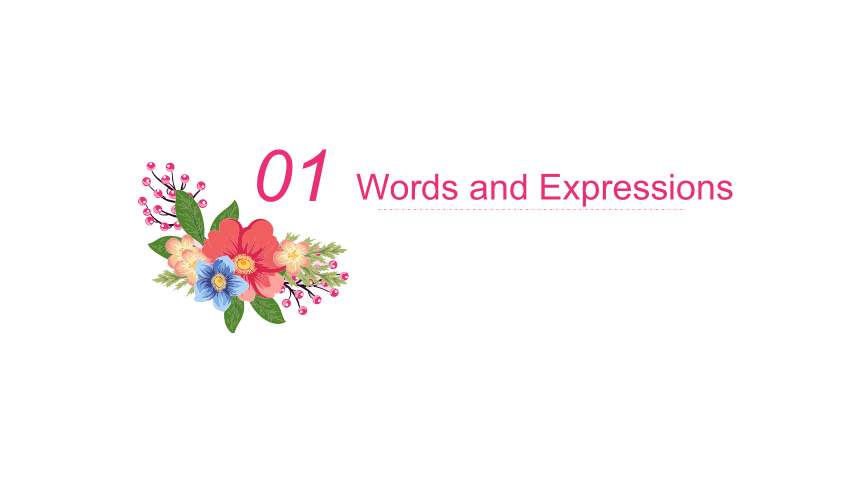
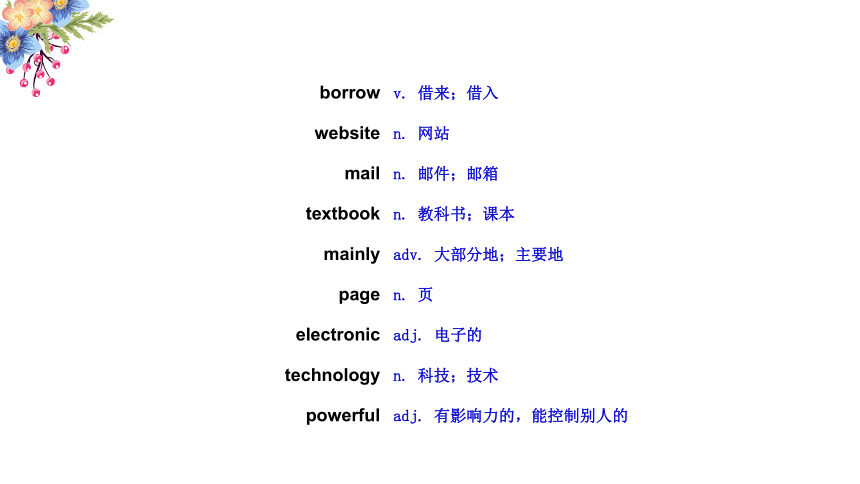
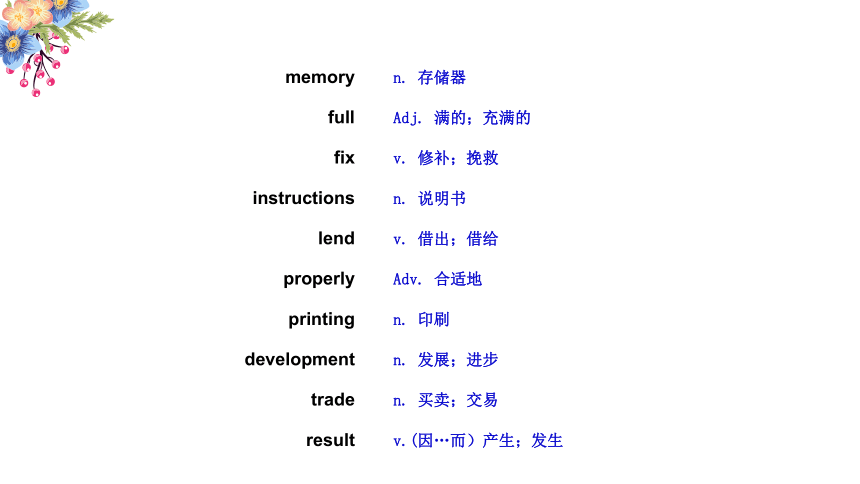
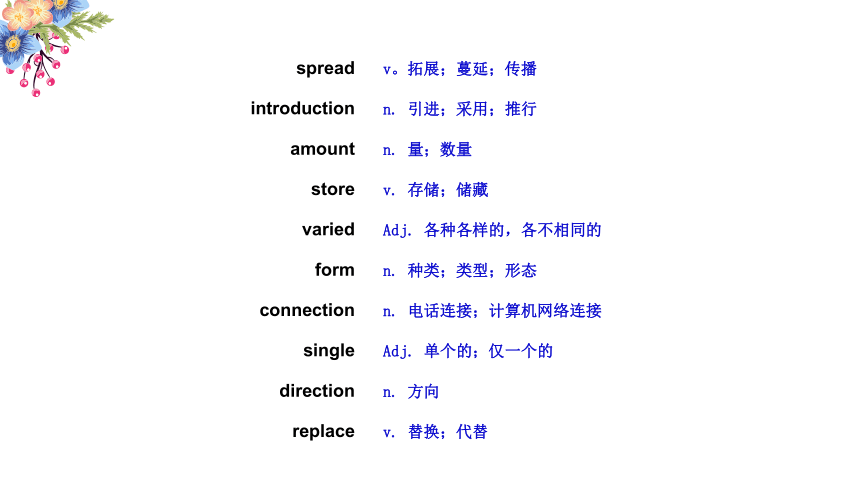
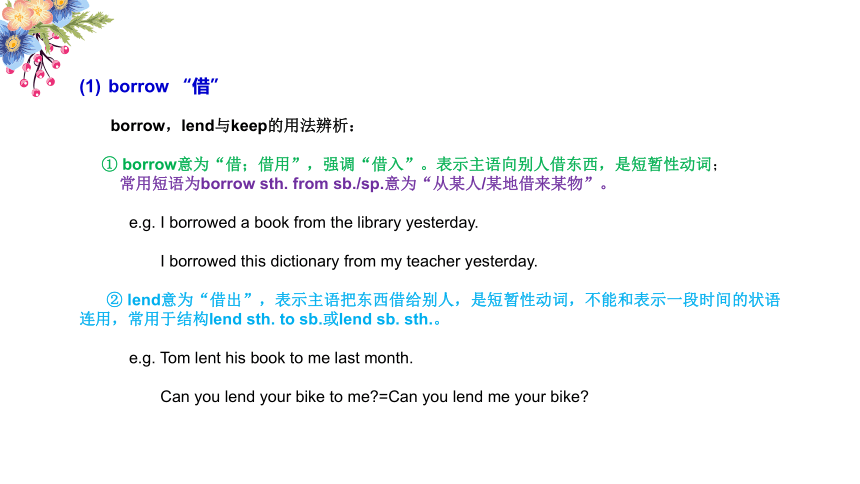
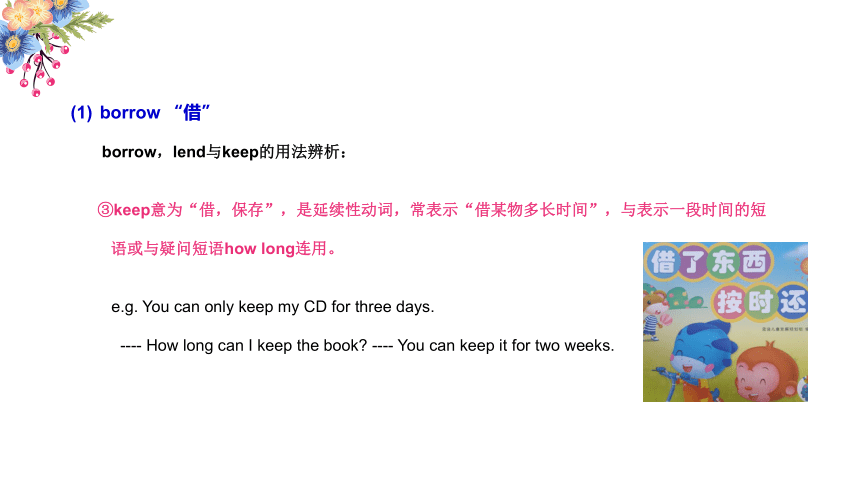
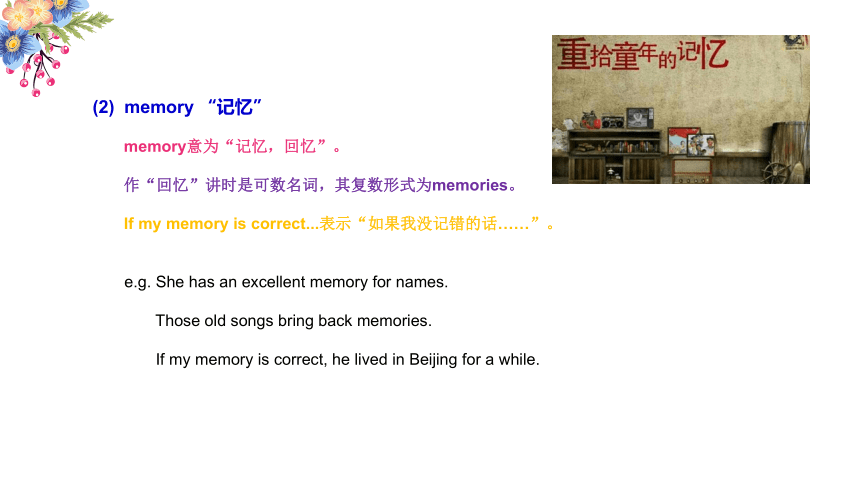
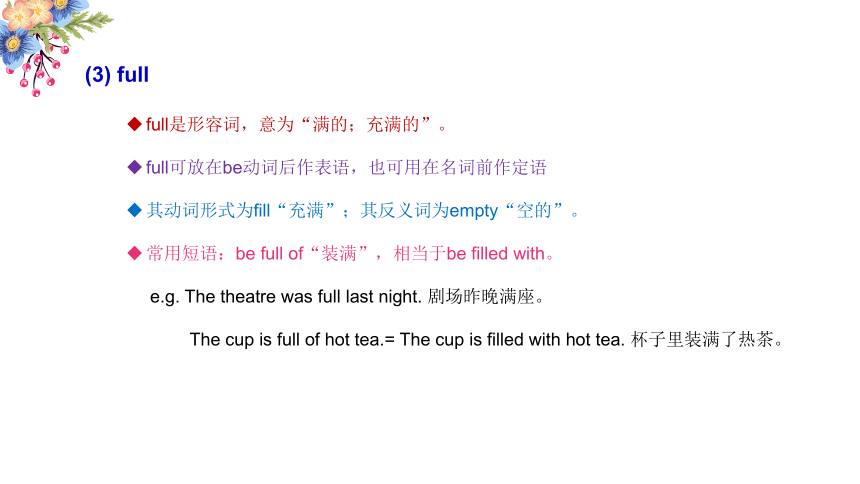

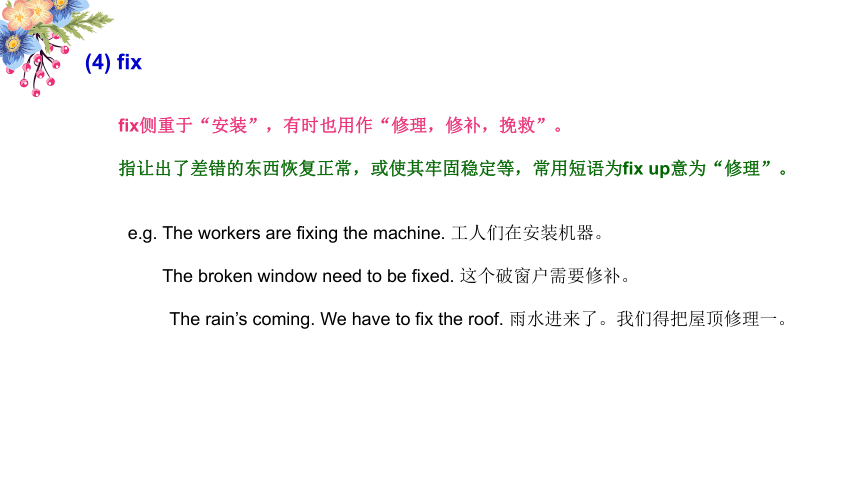
文档简介
Module 9
Great inventions
外研版9年级上册
词法荟萃讲解
Words and Expressions
单元关键句型讲解
Key Structures
CONTENTS
Exercises
单元练习讲解
01
Words and Expressions
borrow
website
mail
textbook
mainly
page
electronic
technology
powerful
v. 借来;借入
n. 网站
n. 邮件;邮箱
n. 教科书;课本
adv. 大部分地;主要地
n. 页
adj. 电子的
n. 科技;技术
adj. 有影响力的,能控制别人的
memory
full
fix
instructions
lend
properly
printing
development
trade
result
n. 存储器
Adj. 满的;充满的
v. 修补;挽救
n. 说明书
v. 借出;借给
Adv. 合适地
n. 印刷
n. 发展;进步
n. 买卖;交易
v.(因…而)产生;发生
spread
introduction
amount
store
varied
form
connection
single
direction
replace
v。拓展;蔓延;传播
n. 引进;采用;推行
n. 量;数量
v. 存储;储藏
Adj. 各种各样的,各不相同的
n. 种类;类型;形态
n. 电话连接;计算机网络连接
Adj. 单个的;仅一个的
n. 方向
v. 替换;代替
borrow “借”
borrow,lend与keep的用法辨析:
① borrow意为“借;借用”,强调“借入”。表示主语向别人借东西,是短暂性动词;
常用短语为borrow sth. from sb./sp.意为“从某人/某地借来某物”。
e.g. I borrowed a book from the library yesterday.
I borrowed this dictionary from my teacher yesterday.
② lend意为“借出”,表示主语把东西借给别人,是短暂性动词,不能和表示一段时间的状语连用,常用于结构lend sth. to sb.或lend sb. sth.。
e.g. Tom lent his book to me last month.
Can?you?lend?your?bike?to?me?=Can?you?lend?me?your?bike?
borrow “借”
borrow,lend与keep的用法辨析:
③keep意为“借,保存”,是延续性动词,常表示“借某物多长时间”,与表示一段时间的短
语或与疑问短语how long连用。
e.g. You can only keep my CD for three days.
---- How long can I keep the book? ---- You can keep it for two weeks.
(2) memory “记忆”
memory意为“记忆,回忆”。
作“回忆”讲时是可数名词,其复数形式为memories。
If my memory is correct...表示“如果我没记错的话……”。
e.g. She?has?an?excellent?memory?for?names.?
Those?old?songs?bring?back?memories.?
If my memory is correct, he lived in Beijing for a while.
(3) full
full是形容词,意为“满的;充满的”。
full可放在be动词后作表语,也可用在名词前作定语
其动词形式为fill“充满”;其反义词为empty“空的”。
常用短语:be full of“装满”,相当于be filled with。
e.g. The theatre was full last night. 剧场昨晚满座。
The cup is full of hot tea.= The cup is filled with hot tea. 杯子里装满了热茶。
(3) full
【拓展】
full还可意为“饱的;吃饱的”,反义词为hungry“饥饿的”。
e.g. I can’t eat any more. I’m full. 我不能再吃了,我饱了。
(4) fix
fix侧重于“安装”,有时也用作“修理,修补,挽救”。
指让出了差错的东西恢复正常,或使其牢固稳定等,常用短语为fix up意为“修理”。
e.g. The workers are fixing the machine. 工人们在安装机器。
The broken window need to be fixed. 这个破窗户需要修补。
The rain’s coming. We have to fix the roof. 雨水进来了。我们得把屋顶修理一。
(5) instructions
instruction作可数名词,意为“指令,命令;指示;教导;用法说明”;
作“说明书”使用时,常用其复数形式instructions。
e.g. Before you take the medicine, read the instructions first.
Read the instructions carefully before you use the machine.
(6) properly
properly是副词,意为“合适地,正确地”。
e.g. I’m learning English, but I still can’t speak it properly.
How much money do we need to do the job properly?
(7) development
development 是名词,意为“发展,进步”,常指某人/事物的抽象的进展。
与development有关的常用搭配:with the development of意为“随着……的发展”
其动词形式为develop,意为“发展,进步”;其形容词形式为developing意为“发展中的”或developed意为“发达的”。
e.g. The development of technology has been very fast.
With the development of our country, our life will become better and better.
(8) spread
spread是动词,意为“扩展;蔓延;传播”。
常用主动形式表示被动含义。
spread可用作及物动词,其宾语可以是具体名词,也可以是抽象名词;同时可作不及物动词。过去式和过去分词均为原形spread。
(8) spread
与spread有关的常用搭配:
spread out张开;伸开;
spread over遍布在……;
spread to传到;蔓延到。
e.g. Bad news spreads very quickly.
Books help spread knowledge and ideas.
The disease spreads easily in spring and autumn.
(9) varied
varied是形容词,意为“各种各样的”,相当于all kinds of。
e.g. There are varied fruits in the fruit shop.
There are a large amount of varied dresses and I don’t know what to buy.
(10) direction“方向”
与direction有关的常用搭配:
in all directions=in every direction 四面八方;
in the direction of朝……方向。
e.g. Tom went off in the direction of home.
He ran away in the direction of the river.
After school the children separated in all directions.
(11) replace“替换,取代”
后常接介词with或by,后常接名词、代词或动名词作宾语。
常指用新的物体代替旧的、破损的或失去的东西,指人时多指取代某一位置以作为替代者或继承者。
与replace有关的常用搭配:
replace sb./sth.意为“替换/取代某人或某物”;
replace…with/by…意为“用……代替”。
(11) replace“替换,取代”
e.g. Candles were replaced by electric lights.
They replaced the old windows with new ones.
They replaced cars by/with buses.
Jack has replaced Tom as monitor of our class.
put up
thousands of
look through
at a time
by hand
in a way
compare…to…
wait and see
张贴;公布
好几千
快速阅读;浏览
每次;一次
用手;靠手做
从某一角度;从某种程度上看
把…比作
等等看;等着瞧
change one’s life
think of
to some degree
take photos/take a photo
wait for
hear from sb.
send and receive mails
in the future
in the past
改变某人的生活
考虑
在某种程度上
拍照
等候
收到某人的来信
收发邮件;
将来
在过去
with the invention of...
memory card
take care of
lend sth. to sb.
send messages by mail
get online
have great influence on...
be replaced by
随着……的发明
内存卡,存储卡
好好照顾
把某物借给某人
通过邮件发送信息
上网
对……有重大影响
被……代替
on on’s way to...
as a result
have a/the chance to do sth.
make it possible to do sth.
in the twentieth century
a large number of
in more varied forms
in the 1960s
在某人去……的路上
结果
有机会做某事
使得做某事成为可能
在二十世纪
大量的;
以更多样的形式
在20世纪60年代;
allow sb. (not) to do sth.
more and more
communicate with sb.
do research
so that
instead of
search for
what is more
(不)允许某人做某事
越来越多的
和某人交流/交谈;和某人联系
做研究
目的是;以便;为了
代替;而不是
搜索;寻找
而且,更重要的是
put up: 挂起;张贴;公布;举起;升起;建立;搭起;抬起
此短语由“动词+副词”构成的短语,代词作宾语时,须放在动词和副词之间。
与put有关的常用搭配:
put away放好;整理好;
put on穿上;戴上;上演;
put off推迟;
put down记下;镇压;
put out扑灭。
e.g. Can you help me put it up on the wall?
Please put up your hands if you have any questions.
thousands of“成千上万的;数以千计的”
**后接可数名词复数,表示概数,不能和数词连用。
e.g. Thousands of birds fly back to the north in spring.
Thousands of people lost their homes in the Ya’an earthquake.
【拓展】英语数量的表达:
① 表示确数(具体数字):
“基数词或several+计数单位(hundred, thousand, million, billion)+名词复数”,意为
“几百/千/百万/十亿……”。
thousands of“成千上万的;数以千计的”
【拓展】英语数量的表达:
② 表示概数(约数或模糊数字):
“计数单位的复数(hundreds, thousands, millions, billions)+of+名词复数”,
意为“数百/千/百万/十亿……或成百上千/成千上万/成百万上千万/成十亿上百亿……”。
thousands of“成千上万的;数以千计的”
【拓展】英语数量的表达:
简记为:模糊数字两有(有s,有of;),具体数字两无(无s,无of;)。
e.g. There are eight hundred students in our school.
Millions of people visit the Great Wall every year.
thousands of“成千上万的;数以千计的”
look through “快速阅读;浏览”
(1) look through是“动词+介词”的结构,后跟代词作宾语时,要放在through的后面。
(2) 与look有关的常用搭配:
look at看……; look around四处看;
look after照顾;照看; look for寻找;
look out小心; look out of向……外看;
look over仔细检查; look up查阅;向上看;
look like看起来像; loon into调查;审查。
look through “快速阅读;浏览”
(1) look through是“动词+介词”的结构,后跟代词作宾语时,要放在through的后面。
(2) 与look有关的常用搭配:
e.g. It’s a good habit to look through the newspaper every day.
Every evening, my mother looks through magazines at home.
He looked through many books in order to find the correct answer.
at a time “每次;一次”
与time有关的常用搭配:
at one time曾经;一度; at times=sometimes有时;
at the time那时; all the time一直,始终;
at the same time同时; on time准时,按时;
in time及时; in no time立刻;马上;
from time to time有时。
at a time “每次;一次”
理解句子意思:
e.g. Please come in one at a time, not all together.
I visited my grandparents at times.
At one time I used to like her, but not any more.
In 1969 the first men landed on the moon—I was twelve at the time.
(1) by用作介词,在这里表示方式、手段,意为“通过……的方式”。
(2) 与hand有关的常用搭配:
on the other hand另一方面;
lend a hand帮助;
hand in hand手拉手;共同地;
at my right hand在我的右手边;
give sb. a hand 帮助某人。
e.g. All these toys are made by hand.
All the beds in my home are made by hand.
by hand “用手;靠手做”
in a way “在某种程度上”
(1) in a way意为“在某种程度上;从某一点上看;从某一角度”。
与way有关的常用搭配:
in this / that / easy / simple way用某种方法;
on one’s way to sp.在某人去某地的路上;
by the way顺便问一下。
e.g. The article is well written in a way.
In a way, difficulty can help us make progress.
【辨析】compare…with…,compare…to…与compared with/to...的用法辨析:
① compare…with…意为“拿……和……作比较;把……与……相比”(同类相比)。
e.g. Mr. Wu likes to compare Class Three with Class Five.
The teacher are always comparing me with my elder sister.
② compare…to…意为“把……比作……”(异类相比,比喻)。
e.g. People often compare a teacher to a candle.
We usually compare the nurses to the white angels.
compare…to… “把…比作…”
【辨析】compare…with…,compare…to…与compared with/to...的用法辨析:
③ compared with/to...意为“和……相比”,该短语通常要求与其他词语组成独立状语,放在句首。
e.g. Compared with/to other cities, I think Guilin is more beautiful.
Compared with/to last year, we have had more success this year.
compare…to… “把…比作…”
e.g. Why not just wait and see what happens?
We’ll have to?wait?and?see?what happens.
wait and see “等等看;等着瞧;拭目以待”
02
Key structures
When I was at school, we waited for weeks to hear from our pen friends abroad. 我上学的时候,我们要等上好几周才能收到国外笔友的来信。
hear from sb.意为“收到某人的来信”,后接表示人的名词或代词,相当于get / receive a letter from sb.
e.g. I heard from my uncle last week.
I?heard from?my sister yesterday.=I got/received a letter from my sister yesterday.
Today, with the invention of the computer and the electronic technology, it’s easy to get information on the Internet. 现在,伴随着电脑和电子科技的发明,我们从网络上获取信息变得非常容易。
with the invention of the computer意为“随着电脑和电子科技的发明”,为介词短语作原因状语。
介词短语作状语的用法很多,可以表示时间、地点、方式、条件、目的、原因等。
e.g. I live near my company.
Can you say it in English?
I have lived in Guilin since 1996.
It’s a gift from your mum for my birthday, so you must promise that you’ll take good care of it. 因为它是你妈妈送给我的生日礼物,所以你必须保证要保管好它。
take good care of …=look after...well意为“好好照顾”。
e.g. The old lady’s son took good care of her.
Please take good care of my pet dog.=Please look after my pet dog well.
Every morning, my father buys a newspaper on his way to work. 每天早上,我爸爸在去上班的路上买份报纸。
on one’s way to 意为“在某人去……的路上”介词to 表示方向,后接名词。如果后面接地点副词,如there, here, home 等则不接to。
e.g. On his way home, he bought a pen.
I pass the store on my way to the library.
And very night, I look at the photos of David Beckham and Yao Ming on my bedroom wall before I go to sleep. 而且每天夜晚之前,都看着卧室墙上大卫.贝克汉姆和姚明的照片。
【辨析】go to sleep,get to sleep,go to bed与be/fall asleep的用法辨析:
① go to sleep与get to sleep意义相近,是终止性动词短语,即“入睡,睡着”,强调进入梦乡的过程。
e.g. I went to sleep quite late last night.
I don’t know when I went to sleep / got to sleep last night.
② go to bed 意为“就寝”,只表示“上床去睡”这一动作,无“睡着”之意,是终止性动词。它的对应词是get up意为“起床”。
e.g. You should go to bed earlier.
What time did you go to bed last night?
And very night, I look at the photos of David Beckham and Yao Ming on my bedroom wall before I go to sleep. 而且每天夜晚之前,都看着卧室墙上大卫.贝克汉姆和姚明的照片。
【辨析】go to sleep,get to sleep,go to bed与be/fall asleep的用法辨析:
③fall asleep意为“睡着”表示一个动作的过程,侧重于“自然而然地入睡”,有时也含有“不想入睡而入睡”之意;be asleep意为“熟睡”,强调睡眠的状态。
e.g. The baby has been asleep for an hour. 这孩子睡着一个小时了。
Can we imagine life without paper or printing? 我们能想象没有报纸和印刷术的生活吗?
imagine是动词,意为“想象,设想”。其用名词形式为imagination意为“想象,想象力”;其形容词形式为imaginary意为“想象的,虚构的”。
① imagine 后接that或what 引导的宾语从句。
如果主句的主语是第一人称I或we时,并且谓语动词为imagine, think, believe,
suppose, consider, expect, feel, find, guess等表示心理活动的词时,如果宾语从句是
否定的,一般要将否定词not转移到主句的谓语动词上,而将宾语从句变成肯定形式,
即否定转移。否则,变否定句看从句。
e.g. I can’t imagine what he looks like.
I believe he will come.(变否定句)→I don’t believe he will come.
I think chicken can swim.(变否定句)→I don’t think chicken can swim.
Can we imagine life without paper or printing? 我们能想象没有报纸和印刷术的生活吗?
② imagine (sb./sb’s )doing sth 想象(某人)做某事。
e.g. Little Tom always imagines becoming a scientist.
③ imagine 后接复合宾语,即“宾语+宾语补足语”,宾语补足语通常是由“动词 不定式(to be)+形谷词”或“as+名词”构成。
e.g. He imagines everything to be easy.
④ imagine后面接名词。
e.g. You can imagine the situation there.
imagine是动词,意为“想象,设想”。其用名词形式为imagination意为“想象,想象力”;其形容词形式为imaginary意为“想象的,虚构的”。
As a result, there were not many books, and they were expensive. 因此,书籍又少,价格又贵。
as a result意为“因此,结果”,是副词短语,表示某种情况或行为所带来的后果,通常单独使用,表示后面句子与前面句子所表达的内容构成因果关系,前面是因后面是果。它与so可以进行转换。
e.g. As a result, they got the cheapest TV set yesterday.
We worked hard. As a result, we got high grades in the exams.
As a result, there were not many books, and they were expensive. 因此,书籍又少,价格又贵。
【拓展】
as a result of=because of是介词短语,意为“由于……,因为……的原因”,后接名词或名词性短语,表示原因。
e.g. She was late as a result of the snow.
As?a?result?of?warning,?nobody?was?hurt.
Later, developments in printing made it possible to produce books more quickly and cheaply. 后来,印刷术的发展使更快更便宜地制造书籍成为可能。
make it+形容词+to do sth.意为“使得做某事……”,it为形式宾语,不定式to do sth.为真正的宾语。
e.g. Spaceships make it possible to travel to the moon.
The English teacher makes it possible to learn English well.
Later, developments in printing made it possible to produce books more quickly and cheaply. 后来,印刷术的发展使更快更便宜地制造书籍成为可能。
【拓展】
① make sb./sth.+形容词/名词/过去分词/动词原形,意为“使得某人或某物处于某种状态”
② make sb. do sth.意为“使某人做某事”。
e.g. The bad news makes the boy sad.(形容词)
We made Jack our monitor yesterday.(名词)
He soon made himself understood.(过去分词)
The boss makes his workers work all day.(动词原形)
A much larger amount of information can be stored in more varied forms on the Internet than in books. 在因特网上比在书籍中更大的信息量会以更多样化的形式被存储。
a large/great amount of意为“大量的”,修饰不可数名词。
amount 是名词,意为“数量;总额,总数”;
与amount有关的常用搭配:
an amount of大量的; a large/great amount of大量的;
amounts of大量的; a small amount of少量的,
A much larger amount of information can be stored in more varied forms on the Internet than in books. 在因特网上比在书籍中更大的信息量会以更多样化的形式被存储。
它们都修饰不可数名词,它们修饰不可数名词作主语时,其谓语的单复数取决于amount的单复数。
e.g. He made a large/great amount of money.
A large amount of money was spent on the bridge.
=A mounts of money were spent on the bridge.
Through the Internet, emails allows us to communicate nearly instantly with people thousands of miles away. 通过因特网,电子邮件允许我们几乎可以立即与几千英里外的人交流。
allow是动词,意为“允许;准许”。
① allow sb. (not) to do sth. 意为“(不)允许某人做某事”。其被动语态为sb. be allowed to do sth.意为“某人被允许做某事”。
e.g. People are not allowed to take photos here.
The teacher allows us to hand in the notebook tomorrow.
My parents never allow me to swim in the river alone.
Through the Internet, emails allows us to communicate nearly instantly with people thousands of miles away. 通过因特网,电子邮件允许我们几乎可以立即与几千英里外的人交流。
allow是动词,意为“允许;准许”。
② allow doing sth. 意为“允许做某事”。
e.g. It doesn’t allow smoking here.
We don’t allow eating in the classroom.
Through the Internet, emails allows us to communicate nearly instantly with people thousands of miles away. 通过因特网,电子邮件允许我们几乎可以立即与几千英里外的人交流。
allow是动词,意为“允许;准许”。
③allow sb. sth. 意为“让某人拥有某物(尤指钱或时间) ”。
e.g. He allows his son too much money. 他给他儿子的钱太多。
We’ll allow you time to answer. 我们将给你回答的时间。
④ allow+that从句,意为“承认……”。如:
e.g. He allowed that I had the right to appeal. 她同意我有权上诉。
We had to allow that he was a good teacher. 我们必须承认他是一个好老师。
Through the Internet, emails allows us to communicate nearly instantly with people thousands of miles away. 通过因特网,电子邮件允许我们几乎可以立即与几千英里外的人交流。
communicate with sb. 意为“和某人交流/交谈;和某人联系”。
communicate是动词,意为“联系;交流”,其名词形式为communication。
e.g. My parents often communicate with me.
The deaf and mute communicate by sign language.
It is much easier and quicker to search for passages now, and we can also write notes in an e-book. 现在搜索文章更容易、更快捷,而且我们还能在电子书中记笔记。
search for意为“搜索;寻找”,search for后要寻找的人或物,表示搜索/寻找某样东西。
e.g. I searched for my watch in the room.
Let’s search for some information about wild animals on the Internet.
It is much easier and quicker to search for passages now, and we can also write notes in an e-book. 现在搜索文章更容易、更快捷,而且我们还能在电子书中记笔记。
【拓展】与search有关的常用搭配:
search sb.搜身;search sp.在某处搜查。
e.g. They searched their homes without any reasons.
The policemen searched everyone at the party.
what is more意为“而且,更重要的是”,是固定短语,常用作插入语,用来表示递进关系。
e.g. He studies very hard, and what’s more, he is ready to help others.
He has got high mark in Chinese. And what’s more, his maths is full marks.
What is more, they save a lot of paper. 更重要的是,他们节省了很多钱。
But e-book readers are still more expensive than paper books, so not all people can afford them. 但是电子阅读器仍然比纸质书贵,所以并不是所有人都能支付得起。
afford 及物动词“(有财力)付得起,买得起”,常与can, could, be able to连用,表示
有能力担负,多用于否定句和疑问句中。其后接名词、代词、动词不定式
(afford to do sth. 意为“有足够的钱做某事”,考查重点)。
e.g. I just can’t afford the time.
The house is too expensive. I can’t afford it.
We can’t afford to go abroad this summer.
03
Exercise
1. Tony thinks it is easy _________ English.
A. study B. learns C. to learn D. studies
2. Many trees must _______ every year.
A. plant B. be planted C. have been planted D. have planted
3. Now telephones are very popular and they are much ______ than before.
A. cheap B. cheaper C. cheapest D. the cheapest
4. I won’t come to the party unless you ______, too.
A. will invite B. invites C. invited D. are invited
5. Look ! _________ students are doing morning exercises on the playground .
A. thousands of B. thousand of
C.two thousands D. two thousands of
6. Stamps are used for ______ letters.
A. send B. to send C. sending D. sent
7. The sports meeting _________next month.
A. will hold B. is going to hold C. will be held D.holds
8. –It’s difficult for the village children to cross the river for school.
– I think a bridge _________ over the river.
A. was built B. is being built C. should be built D. has been built
9. The handbag was made ______ by the women.
A. in hand B. with hand C. by hand D. by hands
10. — What do you think of the song “You and Me”?
— It ________ great. I love singing it.
A. tastes B. looks C. smells D. sounds
11. Please _____ your homework ______ before you hand it in.
A. look; for B. look; after C. look; out D. look; through
12. My bike is broken. Could you help me to____ ?
A. fix it up B. set it up C. make it up D. put it up
13. My cousin told me that he could eat three big apples ____.
A. at time B. at a time C. sometime D. some times
14. –Where is your dictionary, Yu Mei?
–Oh, I _____ it to Amy yesterday. She will return it tomorrow.
A. showed B. lent C. had D. borrowed
15. 一 It's too hot today. 一 Yes. Why don't you ________ your jacket?
A.put on B. put up C. take off D. take after
1. Tony thinks it is easy _________ English.
A. study B. learns C. to learn D. studies
2. Many trees must _______ every year.
A. plant B. be planted C. have been planted D. have planted
3. Now telephones are very popular and they are much ______ than before.
A. cheap B. cheaper C. cheapest D. the cheapest
4. I won’t come to the party unless you ______, too.
A. will invite B. invites C. invited D. are invited
5. Look ! _________ students are doing morning exercises on the playground .
A. thousands of B. thousand of
C.two thousands D. two thousands of
C
B
B
D
A
6. Stamps are used for ______ letters.
A. send B. to send C. sending D. sent
7. The sports meeting _________next month.
A. will hold B. is going to hold C. will be held D.holds
8. –It’s difficult for the village children to cross the river for school.
– I think a bridge _________ over the river.
A. was built B. is being built C. should be built D. has been built
9. The handbag was made ______ by the women.
A. in hand B. with hand C. by hand D. by hands
10. — What do you think of the song “You and Me”?
— It ________ great. I love singing it.
A. tastes B. looks C. smells D. sounds
C
C
C
C
D
11. Please _____ your homework ______ before you hand it in.
A. look; for B. look; after C. look; out D. look; through
12. My bike is broken. Could you help me to____ ?
A. fix it up B. set it up C. make it up D. put it up
13. My cousin told me that he could eat three big apples ____.
A. at time B. at a time C. sometime D. some times
14. –Where is your dictionary, Yu Mei?
–Oh, I _____ it to Amy yesterday. She will return it tomorrow.
A. showed B. lent C. had D. borrowed
15. 一 It's too hot today. 一 Yes. Why don't you ________ your jacket?
A.put on B. put up C. take off D. take after
D
A
B
B
C
感谢您的观看
Great inventions
外研版9年级上册
词法荟萃讲解
Words and Expressions
单元关键句型讲解
Key Structures
CONTENTS
Exercises
单元练习讲解
01
Words and Expressions
borrow
website
textbook
mainly
page
electronic
technology
powerful
v. 借来;借入
n. 网站
n. 邮件;邮箱
n. 教科书;课本
adv. 大部分地;主要地
n. 页
adj. 电子的
n. 科技;技术
adj. 有影响力的,能控制别人的
memory
full
fix
instructions
lend
properly
printing
development
trade
result
n. 存储器
Adj. 满的;充满的
v. 修补;挽救
n. 说明书
v. 借出;借给
Adv. 合适地
n. 印刷
n. 发展;进步
n. 买卖;交易
v.(因…而)产生;发生
spread
introduction
amount
store
varied
form
connection
single
direction
replace
v。拓展;蔓延;传播
n. 引进;采用;推行
n. 量;数量
v. 存储;储藏
Adj. 各种各样的,各不相同的
n. 种类;类型;形态
n. 电话连接;计算机网络连接
Adj. 单个的;仅一个的
n. 方向
v. 替换;代替
borrow “借”
borrow,lend与keep的用法辨析:
① borrow意为“借;借用”,强调“借入”。表示主语向别人借东西,是短暂性动词;
常用短语为borrow sth. from sb./sp.意为“从某人/某地借来某物”。
e.g. I borrowed a book from the library yesterday.
I borrowed this dictionary from my teacher yesterday.
② lend意为“借出”,表示主语把东西借给别人,是短暂性动词,不能和表示一段时间的状语连用,常用于结构lend sth. to sb.或lend sb. sth.。
e.g. Tom lent his book to me last month.
Can?you?lend?your?bike?to?me?=Can?you?lend?me?your?bike?
borrow “借”
borrow,lend与keep的用法辨析:
③keep意为“借,保存”,是延续性动词,常表示“借某物多长时间”,与表示一段时间的短
语或与疑问短语how long连用。
e.g. You can only keep my CD for three days.
---- How long can I keep the book? ---- You can keep it for two weeks.
(2) memory “记忆”
memory意为“记忆,回忆”。
作“回忆”讲时是可数名词,其复数形式为memories。
If my memory is correct...表示“如果我没记错的话……”。
e.g. She?has?an?excellent?memory?for?names.?
Those?old?songs?bring?back?memories.?
If my memory is correct, he lived in Beijing for a while.
(3) full
full是形容词,意为“满的;充满的”。
full可放在be动词后作表语,也可用在名词前作定语
其动词形式为fill“充满”;其反义词为empty“空的”。
常用短语:be full of“装满”,相当于be filled with。
e.g. The theatre was full last night. 剧场昨晚满座。
The cup is full of hot tea.= The cup is filled with hot tea. 杯子里装满了热茶。
(3) full
【拓展】
full还可意为“饱的;吃饱的”,反义词为hungry“饥饿的”。
e.g. I can’t eat any more. I’m full. 我不能再吃了,我饱了。
(4) fix
fix侧重于“安装”,有时也用作“修理,修补,挽救”。
指让出了差错的东西恢复正常,或使其牢固稳定等,常用短语为fix up意为“修理”。
e.g. The workers are fixing the machine. 工人们在安装机器。
The broken window need to be fixed. 这个破窗户需要修补。
The rain’s coming. We have to fix the roof. 雨水进来了。我们得把屋顶修理一。
(5) instructions
instruction作可数名词,意为“指令,命令;指示;教导;用法说明”;
作“说明书”使用时,常用其复数形式instructions。
e.g. Before you take the medicine, read the instructions first.
Read the instructions carefully before you use the machine.
(6) properly
properly是副词,意为“合适地,正确地”。
e.g. I’m learning English, but I still can’t speak it properly.
How much money do we need to do the job properly?
(7) development
development 是名词,意为“发展,进步”,常指某人/事物的抽象的进展。
与development有关的常用搭配:with the development of意为“随着……的发展”
其动词形式为develop,意为“发展,进步”;其形容词形式为developing意为“发展中的”或developed意为“发达的”。
e.g. The development of technology has been very fast.
With the development of our country, our life will become better and better.
(8) spread
spread是动词,意为“扩展;蔓延;传播”。
常用主动形式表示被动含义。
spread可用作及物动词,其宾语可以是具体名词,也可以是抽象名词;同时可作不及物动词。过去式和过去分词均为原形spread。
(8) spread
与spread有关的常用搭配:
spread out张开;伸开;
spread over遍布在……;
spread to传到;蔓延到。
e.g. Bad news spreads very quickly.
Books help spread knowledge and ideas.
The disease spreads easily in spring and autumn.
(9) varied
varied是形容词,意为“各种各样的”,相当于all kinds of。
e.g. There are varied fruits in the fruit shop.
There are a large amount of varied dresses and I don’t know what to buy.
(10) direction“方向”
与direction有关的常用搭配:
in all directions=in every direction 四面八方;
in the direction of朝……方向。
e.g. Tom went off in the direction of home.
He ran away in the direction of the river.
After school the children separated in all directions.
(11) replace“替换,取代”
后常接介词with或by,后常接名词、代词或动名词作宾语。
常指用新的物体代替旧的、破损的或失去的东西,指人时多指取代某一位置以作为替代者或继承者。
与replace有关的常用搭配:
replace sb./sth.意为“替换/取代某人或某物”;
replace…with/by…意为“用……代替”。
(11) replace“替换,取代”
e.g. Candles were replaced by electric lights.
They replaced the old windows with new ones.
They replaced cars by/with buses.
Jack has replaced Tom as monitor of our class.
put up
thousands of
look through
at a time
by hand
in a way
compare…to…
wait and see
张贴;公布
好几千
快速阅读;浏览
每次;一次
用手;靠手做
从某一角度;从某种程度上看
把…比作
等等看;等着瞧
change one’s life
think of
to some degree
take photos/take a photo
wait for
hear from sb.
send and receive mails
in the future
in the past
改变某人的生活
考虑
在某种程度上
拍照
等候
收到某人的来信
收发邮件;
将来
在过去
with the invention of...
memory card
take care of
lend sth. to sb.
send messages by mail
get online
have great influence on...
be replaced by
随着……的发明
内存卡,存储卡
好好照顾
把某物借给某人
通过邮件发送信息
上网
对……有重大影响
被……代替
on on’s way to...
as a result
have a/the chance to do sth.
make it possible to do sth.
in the twentieth century
a large number of
in more varied forms
in the 1960s
在某人去……的路上
结果
有机会做某事
使得做某事成为可能
在二十世纪
大量的;
以更多样的形式
在20世纪60年代;
allow sb. (not) to do sth.
more and more
communicate with sb.
do research
so that
instead of
search for
what is more
(不)允许某人做某事
越来越多的
和某人交流/交谈;和某人联系
做研究
目的是;以便;为了
代替;而不是
搜索;寻找
而且,更重要的是
put up: 挂起;张贴;公布;举起;升起;建立;搭起;抬起
此短语由“动词+副词”构成的短语,代词作宾语时,须放在动词和副词之间。
与put有关的常用搭配:
put away放好;整理好;
put on穿上;戴上;上演;
put off推迟;
put down记下;镇压;
put out扑灭。
e.g. Can you help me put it up on the wall?
Please put up your hands if you have any questions.
thousands of“成千上万的;数以千计的”
**后接可数名词复数,表示概数,不能和数词连用。
e.g. Thousands of birds fly back to the north in spring.
Thousands of people lost their homes in the Ya’an earthquake.
【拓展】英语数量的表达:
① 表示确数(具体数字):
“基数词或several+计数单位(hundred, thousand, million, billion)+名词复数”,意为
“几百/千/百万/十亿……”。
thousands of“成千上万的;数以千计的”
【拓展】英语数量的表达:
② 表示概数(约数或模糊数字):
“计数单位的复数(hundreds, thousands, millions, billions)+of+名词复数”,
意为“数百/千/百万/十亿……或成百上千/成千上万/成百万上千万/成十亿上百亿……”。
thousands of“成千上万的;数以千计的”
【拓展】英语数量的表达:
简记为:模糊数字两有(有s,有of;),具体数字两无(无s,无of;)。
e.g. There are eight hundred students in our school.
Millions of people visit the Great Wall every year.
thousands of“成千上万的;数以千计的”
look through “快速阅读;浏览”
(1) look through是“动词+介词”的结构,后跟代词作宾语时,要放在through的后面。
(2) 与look有关的常用搭配:
look at看……; look around四处看;
look after照顾;照看; look for寻找;
look out小心; look out of向……外看;
look over仔细检查; look up查阅;向上看;
look like看起来像; loon into调查;审查。
look through “快速阅读;浏览”
(1) look through是“动词+介词”的结构,后跟代词作宾语时,要放在through的后面。
(2) 与look有关的常用搭配:
e.g. It’s a good habit to look through the newspaper every day.
Every evening, my mother looks through magazines at home.
He looked through many books in order to find the correct answer.
at a time “每次;一次”
与time有关的常用搭配:
at one time曾经;一度; at times=sometimes有时;
at the time那时; all the time一直,始终;
at the same time同时; on time准时,按时;
in time及时; in no time立刻;马上;
from time to time有时。
at a time “每次;一次”
理解句子意思:
e.g. Please come in one at a time, not all together.
I visited my grandparents at times.
At one time I used to like her, but not any more.
In 1969 the first men landed on the moon—I was twelve at the time.
(1) by用作介词,在这里表示方式、手段,意为“通过……的方式”。
(2) 与hand有关的常用搭配:
on the other hand另一方面;
lend a hand帮助;
hand in hand手拉手;共同地;
at my right hand在我的右手边;
give sb. a hand 帮助某人。
e.g. All these toys are made by hand.
All the beds in my home are made by hand.
by hand “用手;靠手做”
in a way “在某种程度上”
(1) in a way意为“在某种程度上;从某一点上看;从某一角度”。
与way有关的常用搭配:
in this / that / easy / simple way用某种方法;
on one’s way to sp.在某人去某地的路上;
by the way顺便问一下。
e.g. The article is well written in a way.
In a way, difficulty can help us make progress.
【辨析】compare…with…,compare…to…与compared with/to...的用法辨析:
① compare…with…意为“拿……和……作比较;把……与……相比”(同类相比)。
e.g. Mr. Wu likes to compare Class Three with Class Five.
The teacher are always comparing me with my elder sister.
② compare…to…意为“把……比作……”(异类相比,比喻)。
e.g. People often compare a teacher to a candle.
We usually compare the nurses to the white angels.
compare…to… “把…比作…”
【辨析】compare…with…,compare…to…与compared with/to...的用法辨析:
③ compared with/to...意为“和……相比”,该短语通常要求与其他词语组成独立状语,放在句首。
e.g. Compared with/to other cities, I think Guilin is more beautiful.
Compared with/to last year, we have had more success this year.
compare…to… “把…比作…”
e.g. Why not just wait and see what happens?
We’ll have to?wait?and?see?what happens.
wait and see “等等看;等着瞧;拭目以待”
02
Key structures
When I was at school, we waited for weeks to hear from our pen friends abroad. 我上学的时候,我们要等上好几周才能收到国外笔友的来信。
hear from sb.意为“收到某人的来信”,后接表示人的名词或代词,相当于get / receive a letter from sb.
e.g. I heard from my uncle last week.
I?heard from?my sister yesterday.=I got/received a letter from my sister yesterday.
Today, with the invention of the computer and the electronic technology, it’s easy to get information on the Internet. 现在,伴随着电脑和电子科技的发明,我们从网络上获取信息变得非常容易。
with the invention of the computer意为“随着电脑和电子科技的发明”,为介词短语作原因状语。
介词短语作状语的用法很多,可以表示时间、地点、方式、条件、目的、原因等。
e.g. I live near my company.
Can you say it in English?
I have lived in Guilin since 1996.
It’s a gift from your mum for my birthday, so you must promise that you’ll take good care of it. 因为它是你妈妈送给我的生日礼物,所以你必须保证要保管好它。
take good care of …=look after...well意为“好好照顾”。
e.g. The old lady’s son took good care of her.
Please take good care of my pet dog.=Please look after my pet dog well.
Every morning, my father buys a newspaper on his way to work. 每天早上,我爸爸在去上班的路上买份报纸。
on one’s way to 意为“在某人去……的路上”介词to 表示方向,后接名词。如果后面接地点副词,如there, here, home 等则不接to。
e.g. On his way home, he bought a pen.
I pass the store on my way to the library.
And very night, I look at the photos of David Beckham and Yao Ming on my bedroom wall before I go to sleep. 而且每天夜晚之前,都看着卧室墙上大卫.贝克汉姆和姚明的照片。
【辨析】go to sleep,get to sleep,go to bed与be/fall asleep的用法辨析:
① go to sleep与get to sleep意义相近,是终止性动词短语,即“入睡,睡着”,强调进入梦乡的过程。
e.g. I went to sleep quite late last night.
I don’t know when I went to sleep / got to sleep last night.
② go to bed 意为“就寝”,只表示“上床去睡”这一动作,无“睡着”之意,是终止性动词。它的对应词是get up意为“起床”。
e.g. You should go to bed earlier.
What time did you go to bed last night?
And very night, I look at the photos of David Beckham and Yao Ming on my bedroom wall before I go to sleep. 而且每天夜晚之前,都看着卧室墙上大卫.贝克汉姆和姚明的照片。
【辨析】go to sleep,get to sleep,go to bed与be/fall asleep的用法辨析:
③fall asleep意为“睡着”表示一个动作的过程,侧重于“自然而然地入睡”,有时也含有“不想入睡而入睡”之意;be asleep意为“熟睡”,强调睡眠的状态。
e.g. The baby has been asleep for an hour. 这孩子睡着一个小时了。
Can we imagine life without paper or printing? 我们能想象没有报纸和印刷术的生活吗?
imagine是动词,意为“想象,设想”。其用名词形式为imagination意为“想象,想象力”;其形容词形式为imaginary意为“想象的,虚构的”。
① imagine 后接that或what 引导的宾语从句。
如果主句的主语是第一人称I或we时,并且谓语动词为imagine, think, believe,
suppose, consider, expect, feel, find, guess等表示心理活动的词时,如果宾语从句是
否定的,一般要将否定词not转移到主句的谓语动词上,而将宾语从句变成肯定形式,
即否定转移。否则,变否定句看从句。
e.g. I can’t imagine what he looks like.
I believe he will come.(变否定句)→I don’t believe he will come.
I think chicken can swim.(变否定句)→I don’t think chicken can swim.
Can we imagine life without paper or printing? 我们能想象没有报纸和印刷术的生活吗?
② imagine (sb./sb’s )doing sth 想象(某人)做某事。
e.g. Little Tom always imagines becoming a scientist.
③ imagine 后接复合宾语,即“宾语+宾语补足语”,宾语补足语通常是由“动词 不定式(to be)+形谷词”或“as+名词”构成。
e.g. He imagines everything to be easy.
④ imagine后面接名词。
e.g. You can imagine the situation there.
imagine是动词,意为“想象,设想”。其用名词形式为imagination意为“想象,想象力”;其形容词形式为imaginary意为“想象的,虚构的”。
As a result, there were not many books, and they were expensive. 因此,书籍又少,价格又贵。
as a result意为“因此,结果”,是副词短语,表示某种情况或行为所带来的后果,通常单独使用,表示后面句子与前面句子所表达的内容构成因果关系,前面是因后面是果。它与so可以进行转换。
e.g. As a result, they got the cheapest TV set yesterday.
We worked hard. As a result, we got high grades in the exams.
As a result, there were not many books, and they were expensive. 因此,书籍又少,价格又贵。
【拓展】
as a result of=because of是介词短语,意为“由于……,因为……的原因”,后接名词或名词性短语,表示原因。
e.g. She was late as a result of the snow.
As?a?result?of?warning,?nobody?was?hurt.
Later, developments in printing made it possible to produce books more quickly and cheaply. 后来,印刷术的发展使更快更便宜地制造书籍成为可能。
make it+形容词+to do sth.意为“使得做某事……”,it为形式宾语,不定式to do sth.为真正的宾语。
e.g. Spaceships make it possible to travel to the moon.
The English teacher makes it possible to learn English well.
Later, developments in printing made it possible to produce books more quickly and cheaply. 后来,印刷术的发展使更快更便宜地制造书籍成为可能。
【拓展】
① make sb./sth.+形容词/名词/过去分词/动词原形,意为“使得某人或某物处于某种状态”
② make sb. do sth.意为“使某人做某事”。
e.g. The bad news makes the boy sad.(形容词)
We made Jack our monitor yesterday.(名词)
He soon made himself understood.(过去分词)
The boss makes his workers work all day.(动词原形)
A much larger amount of information can be stored in more varied forms on the Internet than in books. 在因特网上比在书籍中更大的信息量会以更多样化的形式被存储。
a large/great amount of意为“大量的”,修饰不可数名词。
amount 是名词,意为“数量;总额,总数”;
与amount有关的常用搭配:
an amount of大量的; a large/great amount of大量的;
amounts of大量的; a small amount of少量的,
A much larger amount of information can be stored in more varied forms on the Internet than in books. 在因特网上比在书籍中更大的信息量会以更多样化的形式被存储。
它们都修饰不可数名词,它们修饰不可数名词作主语时,其谓语的单复数取决于amount的单复数。
e.g. He made a large/great amount of money.
A large amount of money was spent on the bridge.
=A mounts of money were spent on the bridge.
Through the Internet, emails allows us to communicate nearly instantly with people thousands of miles away. 通过因特网,电子邮件允许我们几乎可以立即与几千英里外的人交流。
allow是动词,意为“允许;准许”。
① allow sb. (not) to do sth. 意为“(不)允许某人做某事”。其被动语态为sb. be allowed to do sth.意为“某人被允许做某事”。
e.g. People are not allowed to take photos here.
The teacher allows us to hand in the notebook tomorrow.
My parents never allow me to swim in the river alone.
Through the Internet, emails allows us to communicate nearly instantly with people thousands of miles away. 通过因特网,电子邮件允许我们几乎可以立即与几千英里外的人交流。
allow是动词,意为“允许;准许”。
② allow doing sth. 意为“允许做某事”。
e.g. It doesn’t allow smoking here.
We don’t allow eating in the classroom.
Through the Internet, emails allows us to communicate nearly instantly with people thousands of miles away. 通过因特网,电子邮件允许我们几乎可以立即与几千英里外的人交流。
allow是动词,意为“允许;准许”。
③allow sb. sth. 意为“让某人拥有某物(尤指钱或时间) ”。
e.g. He allows his son too much money. 他给他儿子的钱太多。
We’ll allow you time to answer. 我们将给你回答的时间。
④ allow+that从句,意为“承认……”。如:
e.g. He allowed that I had the right to appeal. 她同意我有权上诉。
We had to allow that he was a good teacher. 我们必须承认他是一个好老师。
Through the Internet, emails allows us to communicate nearly instantly with people thousands of miles away. 通过因特网,电子邮件允许我们几乎可以立即与几千英里外的人交流。
communicate with sb. 意为“和某人交流/交谈;和某人联系”。
communicate是动词,意为“联系;交流”,其名词形式为communication。
e.g. My parents often communicate with me.
The deaf and mute communicate by sign language.
It is much easier and quicker to search for passages now, and we can also write notes in an e-book. 现在搜索文章更容易、更快捷,而且我们还能在电子书中记笔记。
search for意为“搜索;寻找”,search for后要寻找的人或物,表示搜索/寻找某样东西。
e.g. I searched for my watch in the room.
Let’s search for some information about wild animals on the Internet.
It is much easier and quicker to search for passages now, and we can also write notes in an e-book. 现在搜索文章更容易、更快捷,而且我们还能在电子书中记笔记。
【拓展】与search有关的常用搭配:
search sb.搜身;search sp.在某处搜查。
e.g. They searched their homes without any reasons.
The policemen searched everyone at the party.
what is more意为“而且,更重要的是”,是固定短语,常用作插入语,用来表示递进关系。
e.g. He studies very hard, and what’s more, he is ready to help others.
He has got high mark in Chinese. And what’s more, his maths is full marks.
What is more, they save a lot of paper. 更重要的是,他们节省了很多钱。
But e-book readers are still more expensive than paper books, so not all people can afford them. 但是电子阅读器仍然比纸质书贵,所以并不是所有人都能支付得起。
afford 及物动词“(有财力)付得起,买得起”,常与can, could, be able to连用,表示
有能力担负,多用于否定句和疑问句中。其后接名词、代词、动词不定式
(afford to do sth. 意为“有足够的钱做某事”,考查重点)。
e.g. I just can’t afford the time.
The house is too expensive. I can’t afford it.
We can’t afford to go abroad this summer.
03
Exercise
1. Tony thinks it is easy _________ English.
A. study B. learns C. to learn D. studies
2. Many trees must _______ every year.
A. plant B. be planted C. have been planted D. have planted
3. Now telephones are very popular and they are much ______ than before.
A. cheap B. cheaper C. cheapest D. the cheapest
4. I won’t come to the party unless you ______, too.
A. will invite B. invites C. invited D. are invited
5. Look ! _________ students are doing morning exercises on the playground .
A. thousands of B. thousand of
C.two thousands D. two thousands of
6. Stamps are used for ______ letters.
A. send B. to send C. sending D. sent
7. The sports meeting _________next month.
A. will hold B. is going to hold C. will be held D.holds
8. –It’s difficult for the village children to cross the river for school.
– I think a bridge _________ over the river.
A. was built B. is being built C. should be built D. has been built
9. The handbag was made ______ by the women.
A. in hand B. with hand C. by hand D. by hands
10. — What do you think of the song “You and Me”?
— It ________ great. I love singing it.
A. tastes B. looks C. smells D. sounds
11. Please _____ your homework ______ before you hand it in.
A. look; for B. look; after C. look; out D. look; through
12. My bike is broken. Could you help me to____ ?
A. fix it up B. set it up C. make it up D. put it up
13. My cousin told me that he could eat three big apples ____.
A. at time B. at a time C. sometime D. some times
14. –Where is your dictionary, Yu Mei?
–Oh, I _____ it to Amy yesterday. She will return it tomorrow.
A. showed B. lent C. had D. borrowed
15. 一 It's too hot today. 一 Yes. Why don't you ________ your jacket?
A.put on B. put up C. take off D. take after
1. Tony thinks it is easy _________ English.
A. study B. learns C. to learn D. studies
2. Many trees must _______ every year.
A. plant B. be planted C. have been planted D. have planted
3. Now telephones are very popular and they are much ______ than before.
A. cheap B. cheaper C. cheapest D. the cheapest
4. I won’t come to the party unless you ______, too.
A. will invite B. invites C. invited D. are invited
5. Look ! _________ students are doing morning exercises on the playground .
A. thousands of B. thousand of
C.two thousands D. two thousands of
C
B
B
D
A
6. Stamps are used for ______ letters.
A. send B. to send C. sending D. sent
7. The sports meeting _________next month.
A. will hold B. is going to hold C. will be held D.holds
8. –It’s difficult for the village children to cross the river for school.
– I think a bridge _________ over the river.
A. was built B. is being built C. should be built D. has been built
9. The handbag was made ______ by the women.
A. in hand B. with hand C. by hand D. by hands
10. — What do you think of the song “You and Me”?
— It ________ great. I love singing it.
A. tastes B. looks C. smells D. sounds
C
C
C
C
D
11. Please _____ your homework ______ before you hand it in.
A. look; for B. look; after C. look; out D. look; through
12. My bike is broken. Could you help me to____ ?
A. fix it up B. set it up C. make it up D. put it up
13. My cousin told me that he could eat three big apples ____.
A. at time B. at a time C. sometime D. some times
14. –Where is your dictionary, Yu Mei?
–Oh, I _____ it to Amy yesterday. She will return it tomorrow.
A. showed B. lent C. had D. borrowed
15. 一 It's too hot today. 一 Yes. Why don't you ________ your jacket?
A.put on B. put up C. take off D. take after
D
A
B
B
C
感谢您的观看
同课章节目录
- Module 1 Wonders of the world
- Unit 1 It's more than 2,000 years old.
- Unit 2 The Grand Canyon was not just big.
- Unit 3 Language in use
- Module 2 Public holidays
- Unit 1 My family always go somewhere interesting a
- Unit 2 We have celebrated the festival since the f
- Unit 3 Language in use
- Module 3 Heroes
- Unit 1 She trained hard,so she became a great play
- Unit 2There were few doctors, so he had to work ve
- Unit 3 Language in use
- Module 4 Home alone
- Unit 1 I can look after myself, although it won’t
- Unit 2 I became so bored with their orders that I
- Unit 3 Language in use
- Module 5 Museums
- Unit 1 Don't cross that rope!
- Unit 2 If you ever go to London, make sure you vis
- Unit 3 Language in use
- Module 6 Problems
- Unit 1 If I start after dinner, I'll finish it be
- Unit 2 If you tell him the truth now, you will sho
- Unit 3 Language in use
- Revision Module A
- Module 7 Great books
- Unit 1 We're still influenced by Confucius's idea
- Unit 2 It is still read and loved.
- Unit 3 Language in use
- Module 8 Sports life
- Unit 1 Daming wasn't chosen for the team last time
- Unit 2 He was invited to competitions around the w
- Unit 3 Language in use
- Module 9 Great inventions
- Unit 1 Will computers be used more than books in t
- Unit 2 Will books be replaced by the Internet?
- Unit 3 Language in use
- Module 10 Australia
- Unit 1 I have some photos that I took in Australia
- Unit 2 The game that they like most is Australian
- Unit 3 Language in use
- Module 11 Photos
- Unit 1 He's the boy who won the photo competition
- Unit 2 The photo which we liked best was taken by
- Unit 3 Language in use
- Module 12 Save our world
- Unit 1 If everyone starts to do something, the wor
- Unit 2 Repeat these three words daily: reduce, reu
- Unit 3 Language in use
- Revision Module B
